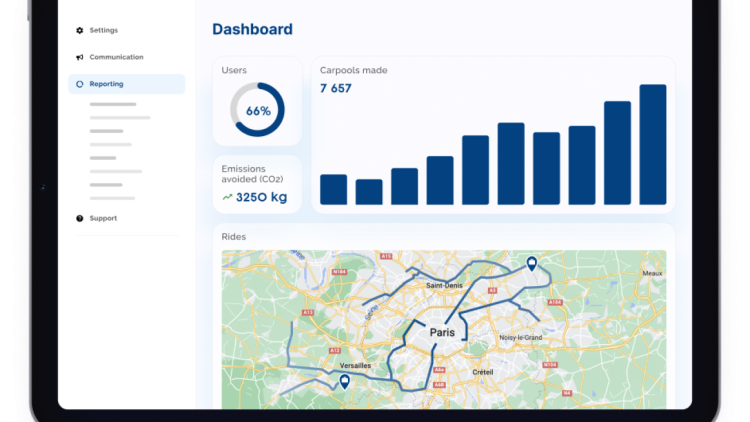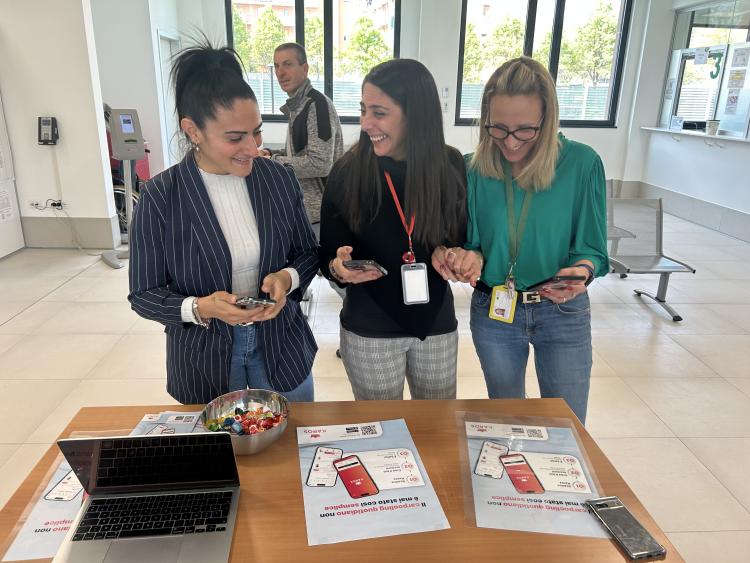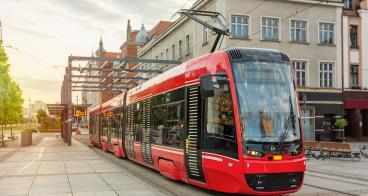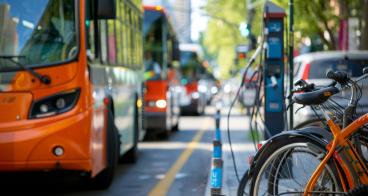Sustainable commuting with carpooling app in Turin, Italy

The Challenge
In Turin’s industrial and suburban zones, commuting depends largely on private cars, creating congestion at peak hours and strong pressure on parking facilities. Public transport options exist but are not well adapted to the geographical spread of companies or to shift-based schedules, particularly in hospitals employing large numbers of staff. Accessibility remains limited for many workers, especially those living in suburban municipalities without direct transit links. The reliance on single-occupancy vehicles generates significant CO₂ emissions, adding to Turin’s air quality challenges, and imposes a substantial economic burden on employees. The pilot addresses these needs by providing a sustainable, affordable, and accessible commuting alternative through daily carpooling.
The Solution
The Karos daily carpooling solution directly addresses the commuting challenges identified in Turin’s industrial and suburban zones.
The app matches drivers and passengers living in dispersed suburban municipalities, enabling workers without direct transit options to access workplaces more easily. Shift workers, such as hospital staff, particularly benefit from flexible ride-sharing opportunities outside traditional public transport schedules.
By encouraging carpooling, the solution reduces the number of single-occupancy vehicles on the road, easing peak-hour congestion and lowering demand for parking near industrial sites. Each carpool reduces CO₂ emissions compared to individual commuting.
Drivers receive remuneration, while passengers save on commuting costs. This redistribution of purchasing power reduces the financial burden of mobility for employees.
By combining a user-friendly mobile app with a SaaS monitoring platform accessible to employers and public authorities, employers and city partners gain access to real-time data (registrations, carpools, CO₂ savings). This supports evidence-based decision-making and strengthens corporate sustainability strategies.

Making an impact
The Turin pilot generated measurable social, ecological, and economic impacts. In total, more than 1,000 employees registered on the Karos app, completing over 4,500 carpools during the demonstration period. This represents a reduction of 2,449 kg of CO₂ emissions and the redistribution of approximately €7,255 in purchasing power, through driver remuneration and passenger savings.
Socially, the solution improved workplace accessibility, particularly for staff in hospitals and industrial zones with shift-based schedules. Ecologically, every shared ride contributed to fewer cars on the road, alleviating congestion and reducing emissions. Economically, employers and city partners benefited from the SaaS monitoring platform, providing real-time mobility data to inform strategies and support sustainability reporting.
User and institutional feedback reinforce these results. As one employee from Città di Torino stated: “We feel part of a positive change for the city, because we believe we are reducing, in our own small way, the environmental impact by using one car for four people instead of four separate cars.”
Simona Guerci, Mobility Manager of ASL Città di Torino, added: “We must say that this carpooling experience is absolutely positive, because we saw good participation results in the adoption of this system, especially in hospitals, where the staff is numerous, works in shifts, and can be particularly interested in using such a solution.”

Lessons learnt
The Turin pilot encountered several challenges during deployment:
- Employer engagement: While 21 companies were identified, only 3 formally onboarded. The planned webinar with the City of Turin was not organised, which limited collective employer mobilisation.
- User hesitation: At the beginning, many employees were reluctant to try a new app and commuting method. Overcoming this required intensive on-site promotion and direct support.
- Uneven adoption: Uptake varied between employers. Hospitals with large, shift-based staff showed stronger participation, while industrial sites with less internal communication faced lower adoption.
Learnings for the future
- Early and continuous involvement of employers, with tailored communication per site, is essential to reach critical mass.
- Combining digital promotion with on-site presence creates trust and facilitates first usage.
- Incentives like free rides and challenges are key to stimulating initial adoption but need to be complemented with long-term engagement strategies.
Success factors and replication potential
- Institutional endorsement from the City of Turin and Piemonte Innova provided credibility and facilitated access to employers.
- User support and incentives ensured adoption despite initial doubts.
- SaaS monitoring platform delivered transparent data (registrations, carpools, CO₂ savings), useful for both companies and public partners.






